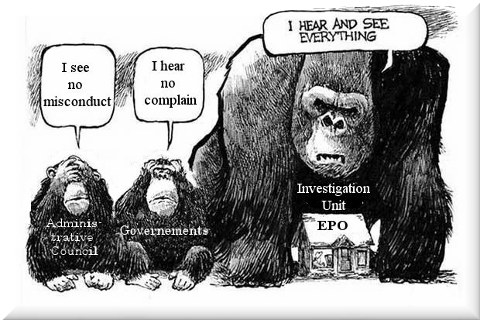

THE EPO may have escaped the scrutiny of the Dutch government (at least for now), but what about the German government, which presides over the whole country including Eponia in Munich and Berlin?
E-mail subject: “Visit of the German Ambassador – cocktail with german colleagues”
Dear colleagues,
On 24 January the German Ambassador will visit the EPO. After the official part, there will be a cocktail to which Mr Minnoye invites you.
In order to allow me to evaluate the number of participants, please use the reply function with “send reply”.
Thank you very much,
⬆⬆⬆⬆⬆⬆⬆⬆⬆⬆⬆⬆ on behalf of Guillaume Minnoye
The “official part” was very short. After having briefly introduced the new German Ambassador Dirk Brengelmann, the responsible site manager VP1 Guillaume Minnoye, left the reception in order to let the German employees discuss alone with their Ambassador. This is unusual, and to my knowledge did not happen before. Mr Brengelmann apparently wanted to use the opportunity of his visit to the EPO for an informal exchange of views about the social climate.
The Ambassador asked those present (about 200) to form small groups; he wanted to talk with them in a less official atmosphere. When asked about the social climate, some shared their feelings about surveillance, witch hunts on union reps and other issues with their ambassador. But one of the persons in the first group, Mr Christoph Forster, was quickly identified as a member of the EPO's Investigative Unit (IU). He said that there are no basic rights violations at the EPO. He had already worked in the Congo, and could confirm that the methods used by the EPO's Investigative Unit compared favourably with Congo-standards. The German Ambassador was impressed.
Mr Forster is German, and one of the two IU members based in Rijswijk, the other one being Malcolm Nicholls (presumably British). Forster's 'job' was apparently to have an 'open ear' for the conversation of his German colleagues with their Ambassador. He did not budge from Mr Brengelmann's side until the end of the reception.
"Those who are sympathetic can often be helpful for a number of years, for example John Kerstens in the Netherlands and Philip Cordery in France (Benoît Battistelli is very concerned about such politicians because they publicly embarrass him in Parliament)."Access to justice at the EPO has been systematically denied for years, according to the ILO. Thus, the immunity of the EPO must be stripped. Team Battistelli shamelessly says (on Dutch television even) that it would ignore court orders. This too should be cause for alarm and for action.
As one person put it earlier today, "the point still remains that actions aimed at denying access to justice - should the EPO management ever stoop that low - might enable counter (legal) actions on new grounds."
"We suggest that a lot of people get in touch with Dirk Brengelmann and explain the situation for him to digest in a short period of time (concision is crucial).""And who, pray tell," replied another person, "will take those counter-actions when there is no longer any SUEPO? Will YOU step forward to put YOUR head on the block?"
We suggest that a lot of people get in touch with Dirk Brengelmann and explain the situation for him to digest in a short period of time (concision is crucial). It always helps to have political allies. They might feel less empowered when dealing with an unaccountable agency, but sooner or later every tyranny falls flat on its face. Pressure on Battistelli to resign is growing from stakeholders too, not just staff. His predecessor too (Roland Grossenbacher) seems increasingly eager to remove him. Impeachment isn't far-fetched at this stage. ⬆